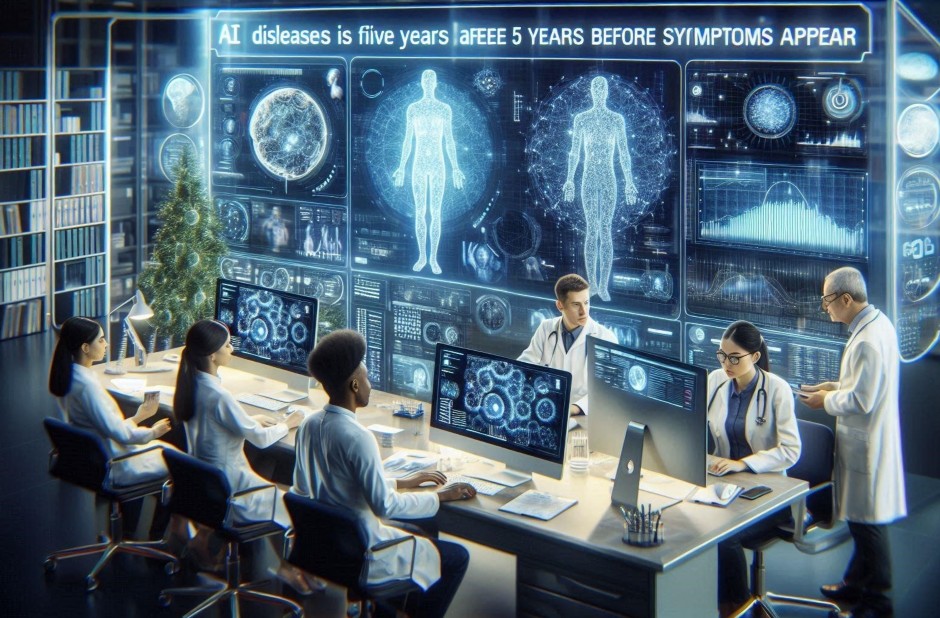In recent years, there has been a significant advancement in the field of Artificial Intelligence (AI) and Augmented Reality (AR). These technologies have become increasingly popular and have the potential to enhance virtual experiences in various fields such as gaming, education, healthcare, and...
AI Now Predicts Diseases Five Years Before Symptoms Appear

Medical science has reached a groundbreaking milestone with the development of artificial intelligence systems capable of predicting diseases up to five years before symptoms become apparent. This revolutionary technology represents a paradigm shift in healthcare, moving from reactive treatment to proactive prevention and early intervention.
How AI Disease Prediction Works
Advanced machine learning algorithms analyze vast datasets of patient information, including medical histories, genetic markers, lifestyle factors, and environmental exposures. These AI systems identify subtle patterns and correlations that human physicians might miss, creating comprehensive risk profiles for individual patients.
Key Data Sources
- Electronic health records spanning decades
- Genetic sequencing and biomarker analysis
- Wearable device data tracking vital signs and activity levels
- Laboratory test results and imaging studies
- Social determinants of health and lifestyle factors
Diseases Successfully Predicted
Current AI prediction models have demonstrated remarkable accuracy in forecasting several major health conditions before clinical symptoms emerge.
Cardiovascular Disease
AI algorithms can identify patients at risk for heart attacks and strokes by analyzing patterns in blood pressure variations, cholesterol levels, and cardiac imaging data. Early detection allows for preventive interventions such as lifestyle modifications and targeted medications.
Diabetes and Metabolic Disorders
Machine learning models predict Type 2 diabetes onset by examining glucose tolerance patterns, insulin resistance markers, and genetic predisposition factors. This early warning enables dietary interventions and preventive treatments before blood sugar levels become problematic.
Neurodegenerative Diseases
Perhaps most significantly, AI systems show promise in predicting Alzheimer's disease and other forms of dementia years before cognitive symptoms appear. These models analyze brain imaging patterns, cognitive test results, and biomarker concentrations to identify at-risk individuals.

Benefits of Early Disease Prediction
Preventive Interventions
Early prediction enables healthcare providers to implement preventive strategies when they are most effective. Lifestyle modifications, dietary changes, and targeted therapies can significantly reduce disease risk or delay onset.
Improved Patient Outcomes
Patients benefit from:
- Earlier treatment initiation leading to better prognoses
- Reduced disease severity and complications
- Enhanced quality of life through prevention
- Lower long-term healthcare costs
Healthcare System Optimization
Predictive AI helps healthcare systems allocate resources more efficiently, focusing on high-risk patients and reducing emergency interventions through proactive care management.
Challenges and Considerations
Ethical Implications
The ability to predict diseases raises important ethical questions about patient privacy, genetic discrimination, and psychological impact. Healthcare providers must carefully consider how to communicate risk predictions without causing undue anxiety or despair.
Accuracy and False Positives
While AI prediction models show impressive accuracy rates, false positives remain a concern. Incorrectly predicting disease onset can lead to unnecessary treatments, increased healthcare costs, and patient distress.
Future Implications
As AI disease prediction technology continues to evolve, we can expect increasingly sophisticated models capable of predicting a broader range of conditions with greater accuracy. Integration with personalized medicine approaches will enable truly individualized prevention strategies tailored to each patient's unique risk profile.
The transformation of healthcare from reactive to predictive represents one of the most significant advances in medical history. By identifying diseases years before symptoms appear, AI technology offers unprecedented opportunities to prevent illness, extend healthy lifespans, and fundamentally reimagine how we approach human health and wellness.



